Film historian Dhruv Somani, catches up with Akbar Khan, for a conversation about the actor-producer-director’s yesterdays and todays.
He may have been out of sight but not out of mind. He had entered the Bollywood scene when he was 17. He had dropped out of college to kick-start his career as the fourth assistant to producer-director Mohan Bijlani who was making Upaasna (1971) with his elder siblings Feroz and Sanjay Khan.
Next Akbar Khan was an assistant, credit was never given to him, to Feroz Khan’s slick action adventure Apradh (1972). Perceiving his enthusiasm for acting, Mohan Bijlani cast him as a college student in Anjaan Raahen (1974) co-starring Feroz Khan, Asha Parekh and Zahira. He was also seen in the Amitabh Bachchan starrer Adalat (1976) (no credit again). His big ticket was making his triple debut as a producer, director and actor with Haadsaa (1983).
I reached out to the youngest brother of the Khan clan to find out about the days that were and what his future game plan is. Here, then, are excerpts from the interview:
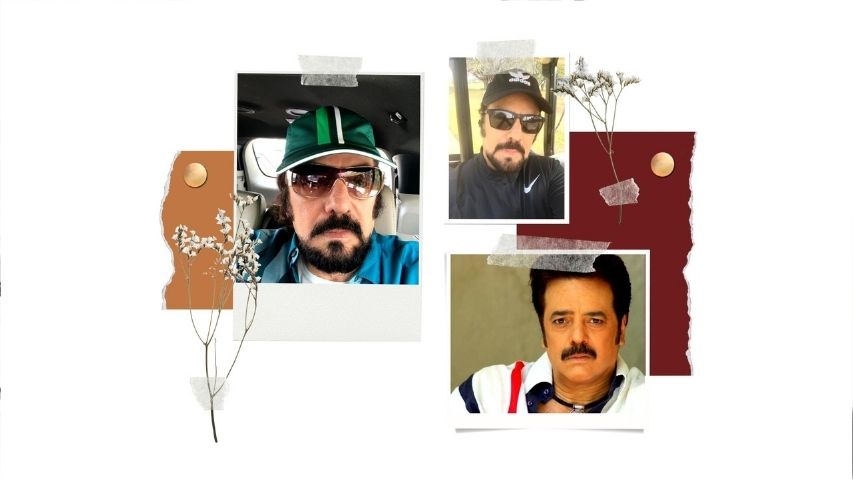
How did Haadsaa happen?
Haadsaa truly happened as a Haadsaa, an accident (laughs). After seeing me in Anjaan Raahen I was called by producer N.N. Sippy to his office who had kind of liked my performance. Being an introvert, I reluctantly went over to meet him. He told me that he had two films already on the floor, Kalicharan (1976) and Fakira (1976), after which he was keen to do a film with me in the lead role, but he didn’t have a script ready.
That’s when the director inside me took over. I narrated a story I had developed in my mind. The very next day he called me over to his house, a high rise in South Bombay, where I narrated the script to him frame by frame like a visual narration. He was speechless for a moment after which he instantly gave me a thumbs-up for the project. The next step was to find a suitable director. But I offered to act and direct the film myself since no one else knew the script better than I did. We raised a toast with a drink and he requested me to keep the project confidential till further announcement. I was super happy and elated, it was a big feather in my cap.
Unfortunately, N.N. Sippy’s two films were delayed. I became impatient since I had this strong urge to start Haadsaa. That’s when one of my friends, Yogesh, offered to finance the film and I completed its first schedule. I had signed Ashok Kumar, Ranjeeta, Smita Patil, Amrish Puri and Naseeruddin Shah. Till then Smita Patil, Naseeruddin Shah and Amrish Puri did not belong to the commercial set-up, they were more devoted to parallel cinema. Haadsaa was a love story with undercurrents of suspense. It was shot on scenic locations in Kashmir, Mahabaleshwar, Dubai, Abu Dhabi and Sharjah. The climax, shot with foreign technicians, was a novelty for that era.
Almost the entire industry was invited for the premiere. Raj Kapoor saab sent me flowers with a personal note, appreciating my efforts as an actor and a technician. Even today, people remember me for Haadsaa. Working with Smita Patil was an electrifying experience; she was a wonderful actress and more importantly a fantastic human being. Ranjeeta, I had met at a discotheque, and had cast her as the main lead opposite me.
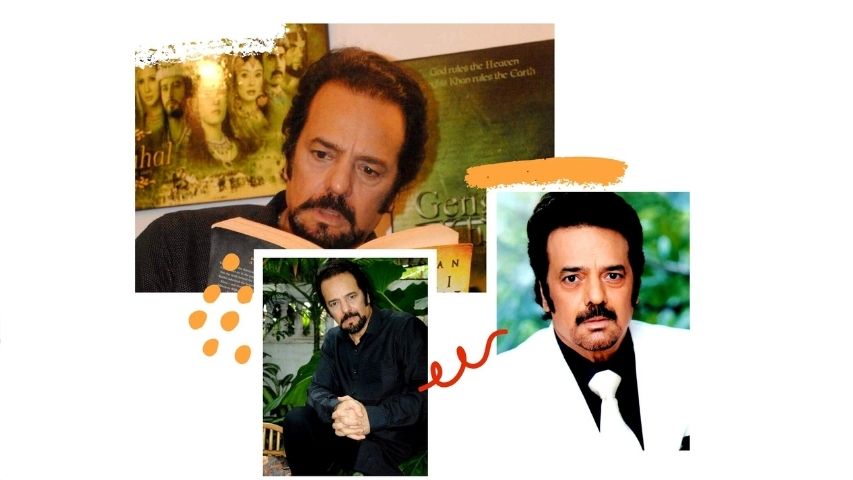
You were in Swati and Jumbish (1986), Muqaddar Ka Faisla (1987), Aakarshan (1988), and Tujhe Nahin Chhodunga (1989) subsequently. Do you feel that you were lost somewhere between the actor and the director within you?
My passion for acting and direction were equally intense. After the success of Haadsaa I wanted to act and direct myself once again in a film titled Naam Hai Krishna. Nine reels were shot, with Amla, Deepti Naval, Amrish Puri, Sadashiv Amrapurkar and me, music was by R.D. Burman. Then suddenly the news came of Sanjay bhai’s accident on the sets of The Sword of Tipu Sultan (1990). I had to shelve my film to be at my brother’s bedside.
I spent almost six to seven months with bhai and his family, in and out of hospitals. I took charge of the prestigious series on behalf of my brother since Doordarshan had invested a lot of money in it. There was such a huge fire on the sets that 42 people had perished and my brother was gravely injured. It was the call of duty as my family came first. I directed the first 20 episodes of The Sword of Tipu Sultan, which earned very high TRP ratings. This changed my career completely since I was away from Bombay in Jaipur. This one was not a professional commitment but a very personal one.
The show was a grand success. We received congratulatory calls from Ramanand Sagar, B.R. Chopra and Manoj Kumar for its grandeur and cinematic touch, which revolutionized the television industry. I directed another serial, Akbar the Great (1988), which was a success too. I had to drop the idea of acting for quite a while.
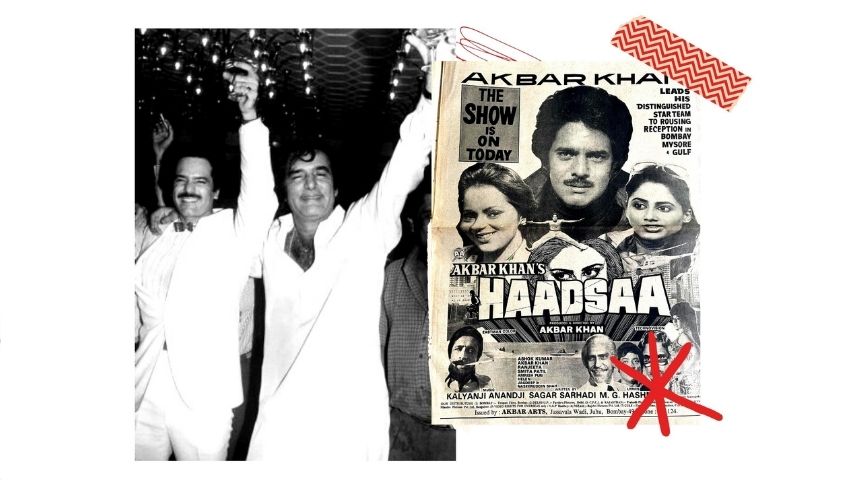
Don’t you think Aakarshan (1988), in which you had acted, was far too bold for those times?
It was a brilliant subject but yes, ahead of its time. Tanvir Ahmed did a great job as a director. It had the longest kiss lip-to-lip, which was taboo then, between Sonu Walia and me. (Laughs) So, in a way, I paved the way for other serial kissers in Bollywood.
To my surprise the censors gave it a clean chit without any cuts. Ajit Singh’s music score remains underrated even today. I still enjoy watching it. Parveen Babi was the original heroine. We had only shot for one song opposite the Sea Rock Hotel at the Bandra Fort ruins there. The moment I went close to her, I saw a strange blankness in her eyes, which sent shivers down my spine. There was a certain coldness I sensed, after which she disappeared from Bollywood. Technically that was her last shot as a heroine. The director retained the song as a tribute to her and replaced her with Sonu Walia.
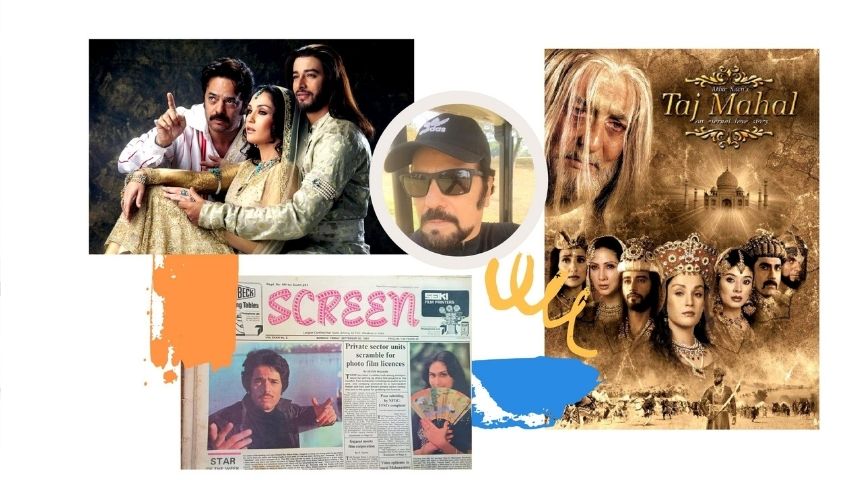
Let’s talk about your favorite film Taj Mahal - An Eternal Love Story? Why do you think it failed at the ticket counters?
Taj Mahal was launched in 2002 and it was one of the biggest films of those times. My cast was headed by the young debutants Zulfi Sayed opposite Sonia Jahan, along with Manisha Koirala, Kabir Bedi, Pooja Batra, Kim Sharma and Arbaaz Khan. It was ready in 2005 and I made the biggest mistake of my life by organizing too many previews for family and friends to gauge their reactions. Everyone raved about it. I took the film to the Cannes Film Festival for marketing where it got a standing ovation.
Mr Srichand Hinduja requested me to have a screening for his family and friends in London, where again I was honored by salutes and praises by the crème de la crème of high society. When I came out to the lobby, I was surprised to see Mr. Yash Chopra who was generous with his compliments. That’s when I requested Yashji to release my film as he had a strong distribution network in Bombay.
Back in Bombay, I chased him to watch the film with his team but he kept dilly-dallying. Over two months were wasted in this effort. So, I released the film Taj Mahal through Subhash Ghai. I did not sell the film, but gave it on a commission basis. Then came the dreaded Friday and to my shock, out of 300 plus theatres I was allotted only 100 and that too with scattered, erratic show timings. When I called back my reels, I saw all my film posters, vinyl’s and other publicity material lying unused. That’s when I realized that my film was sabotaged by some of the powerhouses of Bollywood.
I believe with all your hard work you managed to release your film in Pakistan. What was the response?
After a lot of effort, it was released in Pakistan. I had personally sent a letter to the then President Parvez Musharraf, requesting him to give a go ahead. Then I received a call from our Prime Minister Manmohan Singh who was keen to watch my film. After he watched the film with his close family and other members, I received a standing ovation; they kept clapping continuously for me. I was dumbstruck and overwhelmed with tears of joy. The next morning, he invited me along with my cast over for breakfast and told me to release the film in Pakistan.
Finally, we were in Pakistan with a delegation including Shatrughan Sinha, Mahesh Bhatt and my brothers Feroz and Sanjay bhai along with Zarine and Fardeen who had accompanied me. The then Information and Broadcasting minister, Ambika Soni, headed our team. We were thrilled with the warm welcome on our arrival. It was a triumph for our industry and our country.
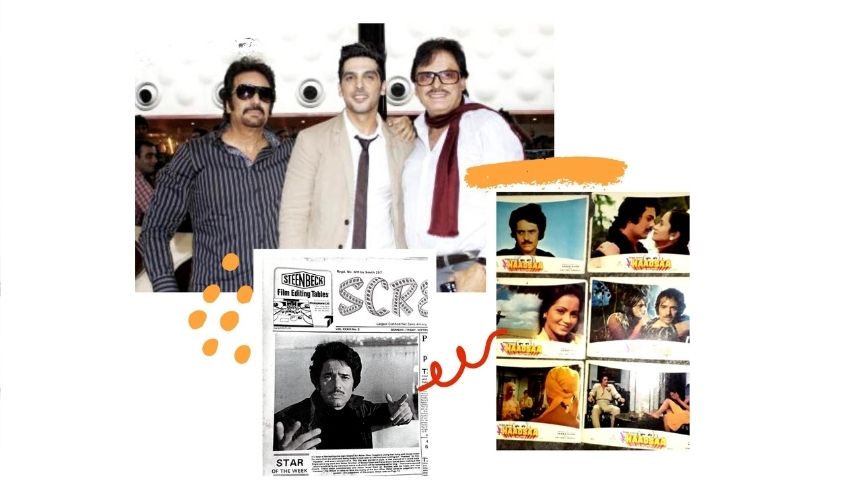
How has been your relationship with your siblings?
All of us brothers can give our lives for each other. We are all strong personalities and are temperamental due to which we have tiffs and arguments, sometimes just like other families. We may not talk to one another for a few days but as they say blood is thicker than water, we make up equally fast. When my brother Abbas bhai (Sanjay Khan) was injured in the accident it was a very difficult time for us all, but what a fight he put up against all odds and survived. He rose back just like a phoenix from the ashes.
My elder brother Feroz bhai looked dynamic and was our inspiration, while my other brother Sameer is robust and pleasant and always smiling. He would never get into a controversy and has a heart of gold. My other brother Shahrukh bhai is a businessman and again temperamental like most of us. And naturally, our sister Dilshad is the apple of our eyes.
How would you react if you accidentally bumped into Ranjeeta someday?
I would be glad to. Frankly, we have briefly been in touch lately on Whatsapp. Her sister, who lived abroad, passed away recently. She was extremely fond of me. I was shocked when I got the news one morning that she was no more. That’s when I connected with Ranjeeta. I was to see her personally but our timings didn’t work out and then she left for Pune. Of course, she’ll always be a dear friend whom I admire and respect.
Who have been your friends in the industry?
I have remained friends with Ranjeet and Danny Denzongpa, Manisha Koirala and Sonu Walia. I had a great rapport with Amrish Puri but he is no more today. Meenakshi Seshadri, too, who is settled abroad. Zulfi has been a close friend ever since he was the hero of Taj Mahal. Ranjeeta and I did share a romantic relationship once, but all romances have their twists and turns eventually.
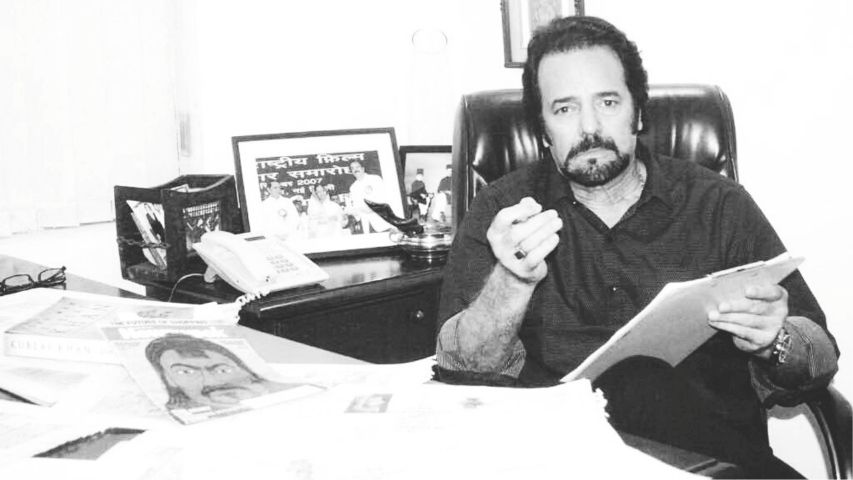
Are you willing to act or to direct on the OTT platform? And also, are you active on social media?
OTT is the call of the day and is giving stiff competition to cinema Of course, I would love to do a good quality film for OTT if I’m approached. My character would need some depth, intensity and scope to perform. The length of the role does not matter to me. I have done a film for an OTT platform recently, Mera India, which deals with the story of a young boy and a scientist, hopefully it should release some time this year.
As for social media, I am essentially on Whatsapp with my circle of friends. I am around on Twitter but tweet only once in a blue moon. Some days ago, I tweeted about Kapil Sharma whose show I adore. I love the witty way he handles his guests who sometimes try to upstage him. I try to watch his shows regularly before I sleep; they keep me in a great mood.
If Haadsaa were to be remade today, whom would you cast?
I definitely see Deepika Padukone in Smita Patil’s role. I also have two scripts ready, the first one being a suspense thriller for an OTT platform, which I intend to make soon. The second one is a big budget project with international stars, which I have been working on since the last decade. Hopefully, it should also begin soon - it was delayed by the pandemic. And you know what? I have missed playing golf all these years, which I intend to start soon.

-853X543.jpg)



-173X130.jpg)

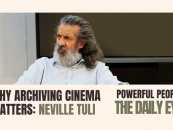
-173X130.jpg)
-173X130.jpg)
-173X130.jpg)
-173X130.jpg)
-173X130.jpg)